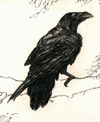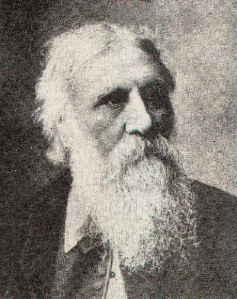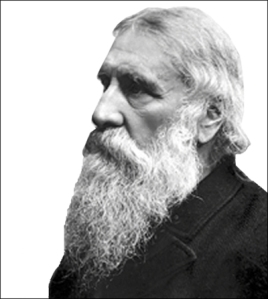
“You can’t live on amusement. It is the froth on water – an inch deep and then the mud.”
– George MacDonald


“You can’t live on amusement. It is the froth on water – an inch deep and then the mud.”
– George MacDonald

 When I made the rather hasty decision of starting a blog based on my love of books, and it came time to find a name for it, I racked my brain thinking of something that might be witty, clever, and memorable for visitors — but when that endeavor utterly failed — my mind focused back on the fantasy novel that has likely had the greatest, and most profound, impact on me over the years and that was George MacDonald’s 1895 masterpiece, Lilith. Arguably his greatest work. In it, there is a peculiar raven that helps kick off the tale and he serves to be a wonderful surprise in the book and I thought it an appropriate theme of ‘beckoning beyond’ for the blog here.
When I made the rather hasty decision of starting a blog based on my love of books, and it came time to find a name for it, I racked my brain thinking of something that might be witty, clever, and memorable for visitors — but when that endeavor utterly failed — my mind focused back on the fantasy novel that has likely had the greatest, and most profound, impact on me over the years and that was George MacDonald’s 1895 masterpiece, Lilith. Arguably his greatest work. In it, there is a peculiar raven that helps kick off the tale and he serves to be a wonderful surprise in the book and I thought it an appropriate theme of ‘beckoning beyond’ for the blog here.
But more on that as we go, don’t want to get too ahead of myself.
As Lilith opens, readers are immediately introduced to one Mr. Vane, a recent graduate of Oxford University and the inheritor of his families English estate. Additionally, we learn of a mysterious specter that may be haunting the vast library within which servants in the home have heard whisperings of for some time. And thus the tale begins in earnest when having spotted the specter Mr. Vane rushes after him, following him anxiously into a series of twists and turns in his home that he had heretofore been unfamiliar with, and straight into a small chamber in a vast expanse of chambers. There, his gaze falls from sunlight forcing its way into the room upon an old mirror within:
It had an ebony frame, on the top of which stood a black eagle, with outstretched wings, in his beak a golden chain, from whose end hung a black ball. I had been looking at rather than into the mirror, when suddenly I became aware that it reflected neither the chamber nor my own person. I have an impression of having seen the wall melt away, but what followed is enough to account for any uncertainty:–could I have mistaken for a mirror the glass that protected a wonderful picture? I saw before me a wild country, broken and heathy. Desolate hills of no great height, but somehow of strange appearance, occupied the middle distance; along the horizon stretched the tops of a far-off mountain range; nearest me lay a tract of moorland, flat and melancholy.
Being short-sighted, I stepped closer to examine the texture of a stone in the immediate foreground, and in the act espied, hopping toward me with solemnity, a large and ancient raven, whose purply black was here and there softened with gray. He seemed looking for worms as he came. Nowise astonished at the appearance of a live creature in a picture, I took another step forward to see him better, stumbled over something–doubtless the frame of the mirror–and stood nose to beak with the bird: I was in the open air, on a houseless heath!
The Raven then…speaks. And he informs our hero in a coarse, bird-like, voice that the best way to find out where he has come is to first “do something,” and that it best involve making himself “at home” in his new surroundings. MacDonald employs these riddles, thoughtful insights, and a grand imagination to force us to ask questions and to bring to vivid life a world that will forever change Mr. Vane as he struggles towards self-discoveries that test notions about his ‘self’ and the perceptions of everything around him, and in many cases, alters them completely. Along the way Vane will meet giant abominations that rise from the ground below in the hopes of devouring prey, dancing skeletons, ignorant giants, the innocent “little ones,” ghosts of the fallen, great giant cats, a protective moon, and of course, Lilith herself. Prior knowledge of Lilith is relatively unnecessary to enjoy the story but in supplying a little background, according to some texts in Jewish folk tradition, Lilith was Adam’s first wife in the Garden of Eden and the two had a falling away from one another when after a fashion Adam implored Lilith to submit to his will. Following her refusal she became a demon, with great power, plaguing the children of men thereafter. MacDonald uses her as a character in the tale as a means of setting up theological, physiological and psychological conflict between herself and Mr. Vane but even more so as a means of exploring the issues of good and evil, defiance, beauty, repentance, to ultimately even mercy as it applies to us all.
So much was ours ere ever the first sun rose upon our freedom: what must not the eternal day bring with it!
Comments:
I’ve meandered through Lilith on at least 3 different occasions now, and I use the word “meander” to intentionally denote that the experience is not one to be taken lightly, or at an accelerated pace, if indeed the reader wants to get as much out of it as possible. Right off the bat it’s important to understand that this is a Christian work and that MacDonald requires an honest effort from the reader to work within himself to both ask and answer questions that the book presents in order to best move forward. If a work of faith is not what you’re looking for then perhaps its best to look elsewhere, though I’d always recommend giving it a try first. And like Mr. Vane, we won’t have all the answers right in front of us but little by little a small phrase here becomes deeper in its allegory, and a symbol there becomes a clue to the true nature of a character. But make no mistake, this is a fun and entertaining book full of thought that’s worth reading as a fantasy “romance” but there are certainly levels to what one can take from it. After 3 readings I’m more and more aware that I’ve not even scratched the surface of all there is to glean from its contents, but I come out of it even more fulfilled than the last time and maybe a little more honest with myself with each attempt. It is not a pretentious work reeking in the idea of its own self-importance by any means, rather, it is an experience in reflection exposing some really nasty stuff, while offering a hopeful alternative if we’re willing to learn and grow as Mr. Vane ultimately chose to do. At its heart, Lilith is a novel about finding one’s true self and where true happiness comes from and thus it becomes a deeply personal work. Which is likely the point.
If you’ve never had the chance to read anything by George MacDonald and wonder what it was that inspired the likes of C.S. Lewis, J.R.R. Tolkien, and Lewis Carroll among the other giants of fantasy then please do yourself a favor and take some time to acquaint yourself with any number of his stories. They’re all extremely enriching experiences.
And I give Lilith the highest recommendation.

 Welcome to Follow that Raven, a blog of sorts where I can upload thoughts, reviews, and “insights” into current books that I’m reading, be they fantasy, sci-fi, speculative fiction or a few other genres from time to time. Pull up a chair anytime you’d like and always feel free to jump in with your thoughts.
Welcome to Follow that Raven, a blog of sorts where I can upload thoughts, reviews, and “insights” into current books that I’m reading, be they fantasy, sci-fi, speculative fiction or a few other genres from time to time. Pull up a chair anytime you’d like and always feel free to jump in with your thoughts.
For anyone that may be curious, the themes of the raven and a mirror’s journey are my way of paying tribute to 18th century Scottish author, and grandfather of fantasy George MacDonald. The work of C.S. Lewis introduced me to MacDonald’s vast library years ago and I couldn’t think of anyone more appropriate to shape a fantasy theme after than the man Lewis coined his “master” and the one that has ultimately inspired so many of the masters today.